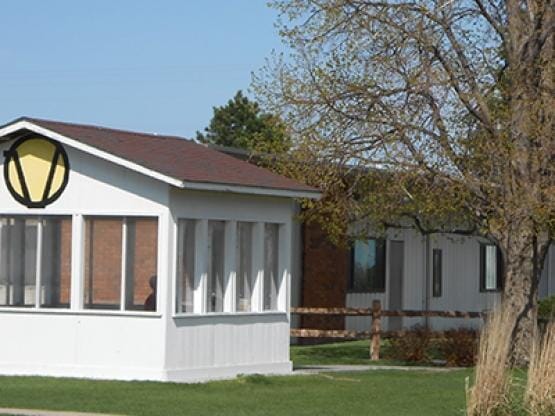Founded in 1977, the O’Neill Valley Hope facility offers residential treatment for men and women ages 16 and up. The facility takes a 12-step approach to recovery, and combines AA’s principles with psycho-educational and small-group counseling to give each client a solid foundation for long-lasting sobriety. Family support and education is also provided, as is a plan for continued care long after treatment is complete.
ABOUT VALLEY HOPE — O’NEILL
Valley Hope in O’Neill, Neb., is one of the nonprofit organization’s 16 substance abuse treatment facilities located in seven states. The Holt County rehab center provides detoxification services, 12-step-based residential care, family programming, medication-assisted therapy, and aftercare. Tele-therapy is also available through Valley Hope and an Omaha facility offers outpatient programming. Other Valley Hope locations include treatment centers in Arizona, Kansas, Missouri, and Oklahoma.
TREATMENT & ASSESSMENT
Clients can participate in an initial assessment online or by phone with Valley Hope. Once at the O’Neill facility, each individual receives a full physical and psychological evaluation.
Those who require assistance for withdrawal symptoms can expect to spend a few days in medically monitored detoxification. The clinical staff recommends 30 days in residential treatment, and the Valley Hope website reports that clients typically remain between 17 and 30 days.
During this time, residents can expect to spend more than 40 hours a week in a mix of group and individual therapy, family counseling, 12-step meetings and lessons, and addiction education. Programming also includes wellness activities and non-denominational pastoral counseling. Clients participating in Valley Hope’s Suboxone program receive prescribed medication in combination with an intensive, full-day behavioral therapy program.
After completing residential treatment, alumni can participate in a once-a-week continuing care group at the O’Neill facility. Aftercare is also available remotely by way of Valley Hope Telehealth. Through this online program, individuals can connect 24/7 with counselors and peers.
Valley Hope’s intensive family support program includes online and on-site sessions and is open to individuals with or without relatives involved in Valley Hope rehabilitation.
STAFF CREDENTIALS
Valley Hope residential facilities, including O’Neill, employ physicians, psychologists, nurses, counselors, and chaplains. The organization operates an extensive counselor training program, during which trainees in an accredited degree program serve on-site.
ACCOMMODATIONS & AMENITIES
The O’Neill Valley Hope facility accommodates up to 76 residents at a time. Website photographs depict a single-story treatment and residential building surrounded by open spaces, outdoor gathering spots, and a chapel. The rural setting is about 40 miles from the South Dakota border.
Clients are permitted to bring cell phones with them to treatment, which are subject to usage regulations. Few other details regarding living arrangements and related offerings are available. However, a total of 15 individuals polled by Best-rehabs.com – a mix of alumni and loved ones of clients – granted highly favorable ratings of 4.5 out of five stars on average for the facility’s cleanliness and upkeep, and 4.1 for meals and nutrition. Alumni also expressed satisfaction with opportunities for exercise and leisure activities, with a 3.7-star average rating.
WHAT ALUMNI SAY
To date, 10 former clients have provided feedback to Best-rehabs.com for Valley Hope O’Neill. Seven would recommend the rehab center to others and the nine polled rated both the effectiveness of treatment and the staff’s level of training and experience 4.2 stars. Several reviewers mentioned appreciation for the fact that many counselors were in recovery themselves. One-third praised the program’s aftercare support.
Family participation, a facility priority, received alumni’s highest rating on average, with 4.4 stars. On the other hand, reviews tended to represent treatment as limited in focus, granting just 2.3 stars for holistic therapy offerings and a moderate 3.2 for options in counseling approaches. Alumni opinions were split between high and low regarding treatment for co-occurring substance use and other mental health disorders, as well as on whether the facility’s flexible approach to regulations was positive or negative.
Four of the five former clients asked to rate the affordability of treatment awarded four or five stars, while one gave just one.
WHAT FRIENDS & FAMILY SAY
Six of the seven loved ones polled by Best-rehabs.com would strongly recommend Valley Hope in O’Neill. Treatment effectiveness received on average a 4.2-star rating and affordability four stars. Four polled on staff experience all agreed with alumni that this was a facility strength. Comments highlighted counselors as knowledgeable.
The center’s family programming was also well-received by loved ones, garnering an average rating of 4.33 out of five stars. One survey respondent, Kathy, who described her brother as a “changed person,” wrote: “We were encouraged to visit and attend classes to learn how to help.”
A few criticisms referenced the length of treatment. Two loved ones shared a desire for more than 30 days of programming and one pointed out the importance of a client remaining to the end for the best outcomes. While one reviewer reported concerns about a lack of personalized care, on average, six loved ones polled granted 4.3 stars for flexibility in counseling to meet client preferences.
WHAT STAFF SAY
The two staff members polled by Best-rehabs.com at the time of this writing shared praise for their employer. Both poll respondents provided five-star ratings for the center’s quality of care and staff’s honesty and credentials. One alum addressed the open nature of the campus noted by alumni, writing: “People have an opportunity to become accountable, we allow people to make choices, we do not make them for them.”
Among the facility’s strengths, staffer J.V. listed “Willingness to accept clients despite financial issues.”
FINANCING
According to the Valley Hope website, the rehab center offers a 10 percent discount to clients who self-pay for their treatment. At the time of this writing, the website also reports that treatment is covered in-network by most insurance plans. Payment plans can be arranged and a limited amount of financial aid is available for qualifying individuals.
